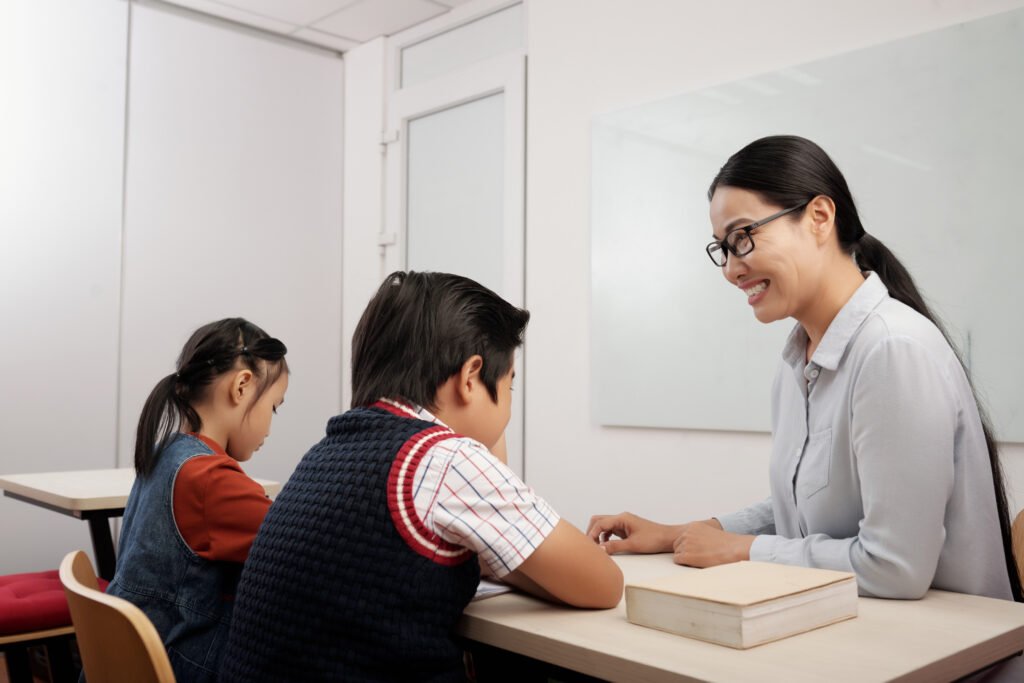Teaching Chinese as a Foreign Language to Kids for Singaporean Expat Parents
Teaching Chinese as a Foreign Language to Kids for Singaporean Expat Parents

Mandarin is a staple part of Singapore, where most people are able to communicate in this language. If you’re an expat living in Singapore, your children might encounter Mandarin as part of their school curriculum. In this situation, learning Chinese as a foreign language for kids becomes increasingly important to help them academically and socially. As expats in Singapore, teaching Chinese to kids might sound easier said than done. However, the right method can help you effectively introduce Chinese as a foreign language to your children. In this article, we will discuss how to teach Chinese as a foreign language to kids as Singaporean expat parents.
Why Singaporean Expat Kids need to Learn Chinese

At first glance, learning Chinese for Singaporean expat kids might only have the obvious benefit of encouraging academic progression. However, it is important for parents to understand that teaching Chinese as a foreign language to children has a deeper impact than improving their grades. Here are a few reasons why expats kids need to learn Chinese as a foreign language.
Encourage Cultural Exchange
While learning Chinese, children will usually be encouraged to implement their knowledge across several media. This will help children to not only learn the language, but also have the opportunity to get connected with local traditions through what they’ve learned. For example, children who learn about greetings in Chinese will also be taught about popular traditions such as Chinese New Year and its greetings. Thus, learning Chinese as a foreign language is not only beneficial for communication, but also can help children understand Chinese cultures to adapt smoothly with their environment.
YOU MIGHT ALSO LIKE: Want to Teach Your Kids About Chinese Culture? Try These 5 Fun Activities!
Develop Cognitive Ability
Chinese is widely known for its difference in speaking and writing systems. Learning a foreign language with a completely distinguished system can help stimulate children’s brain development, letting them have a better grasp on spotting similarities and differences between several languages. On top of that, many researchers have proven that learning a new foreign language can help children with developing their creative thinking and problem solving skills.
YOU MIGHT ALSO LIKE: 10 Reasons Why Early Mandarin Education is Good for Your Kids
Increase Social Interaction
Many people in Singapore are used to speaking in Chinese, including children. Although communicating solely in English is plausible, expats kids who understand Chinese will face less language barrier. This ability will also help them broaden their social network with peers outside of school.
Teaching Foreign Language to Kids with Easy Steps to Chinese

Easy steps to Chinese is one of the most known book series targeted for young non-Chinese children who wish to learn Mandarin as a foreign language. This book is widely used to help expat kids to learn Mandarin due to its easy-to-digest materials that can boost understanding in a shorter period of time. This book is suitable for non-Chinese students around primary and secondary level that aim to take a Chinese exam. If you’re looking to use Easy Steps to Chinese to help your children learn Chinese, here are a few features that can help young learners develop their skills.
Perfect for Gradual Progress
Easy Steps to Chinese is divided into different book series aimed to help children to learn this foreign language from the basics. Each volume of the book will tackle a different topic, with book one focusing on learning the foundation of Chinese such as consonants, vowels, and tones. Aside from building a strong foundation on Pinyin, children will also be taught essential Chinese vocabulary that can help them communicate in Chinese.
Relevancy to Real-Life Situations
Easy Steps to Chinese will not only teach children about Chinese language in theory, but also will provide short texts with real-life examples on how to implement previously known vocabulary in conversations. Providing real-life examples will not only help children with finding connections with their learning materials, but also encourage them to start using Chinese phrases during similar circumstances.
Focus on Developing Skills
Easy Steps to Chinese materials are designed to help children develop the four main skills needed to achieve fluency while learning foreign languages. These skills include listening, speaking, reading, and writing skills. These skills are constantly trained while using Easy Steps to Chinese book series with audio materials, example texts, and exercises.
Tasks and Assessments
Easy Steps to Chinese can also help expat children learn this foreign language by providing tasks and assessment that they need to complete. Utilizing tasks and assessments are perfect to encourage active recall, where children will attempt to solve the activities by remembering and implementing what they’ve learned before. Furthermore, these tasks can also help measuring kids’ current ability and which area they need to improve.
Easy Steps to Teach Chinese to Young Learners as Expat Parents

Helping children to learn Chinese as a foreign language is incredibly important since most of the time children are not capable of arranging their own learning schedule. In this situation, support from parents is proven to be important to encourage consistent learning in their kids. As an expat parent in Singapore, teaching Chinese to young learners might not be the easiest task to do, especially if you’re not fluent in the language yourself. Here are a few steps on teaching children to learn Chinese as a foreign language that you can implement.
YOU MIGHT ALSO LIKE: Learning Conversational Chinese for Kids at Home When Parents Don’t Speak It
Learn Tone and Pinyin
Learning tone and pinyin is the first key to encouraging fluency in learning Chinese as a foreign language. Expat parents can help children learn tone and pinyin by constantly supporting them in practicing how to pronounce syllables and determine tones based on what they’ve listened to. Furthermore, parents can also support children learning tone and pinyin by providing them with the necessary tools, such as Pinyin charts, audio cognition books, and worksheets.
YOU MIGHT ALSO LIKE: How to Find the Best Resources for Learning Chinese Pinyin Effectively for Kids
Establish Chinese Vocabulary Foundation
Without knowing about basic vocabulary, children will not be able to communicate in Chinese. Therefore, it is important for expat parents to start establishing a solid foundation in learning Chinese vocabulary. This goal can be achieved by starting with everyday vocabulary, such as family members, numbers, animals, color, etc. If you’re still confused about what Chinese vocabulary that you need to start with, you can refer to the Easy Steps to Chinese books as they will provide basic Chinese vocabulary aimed to help children build a strong foundation. Other than exercises provided within the book, parents are also encouraged to help children with other tools such as flashcards that can encourage active recall in children.
Understand Sentence Structure and Grammar
A basic pattern of sentence structure in Chinese is similar to many other languages, which make it relatively easy for expat kids to learn Chinese as a foreign language. The most commonly used structure in Chinese usually consists of Subject + Verb + Object. With these 3 components, children will be able to hold basic conversations with others. For example, children will be able to tell about their current activities only by using this simple structure such as 我喝水 (wǒ hē shuǐ = I drink water).
Implement and Practice
After having the basics of tones, pinyin, vocabulary and sentence structure, children should be able to implement their knowledge first-hand. This means, children are not only studying by memorizing and reading, but they can also start speaking and even writing! When it comes to mastering Chinese as a foreign language, consistency is super important to help children get fluent. Therefore, you can encourage them by asking them to answer simple questions in Chinese or encourage them to enjoy Chinese media in accordance with their interest.
Learn Chinese as a Foreign Language with EliteKid
Expat children in Singapore will benefit greatly from learning Chinese as a foreign language. Understanding this language will not only help them academically at school, but assist them in building a broader connection with peers and locals. When it comes to learning Chinese as a foreign language, Easy Steps to Chinese is known as one of the popular book options dedicated for non-Chinese students. However, learning only by book may eventually lead children into a learning plateau. The good news is that many Chinese course options are now available to choose from to help maintain a fun environment for children to learn with interactive activities. Learn more on Elitekid can help your expat kids learn Chinese as a foreign language by visiting our site.





